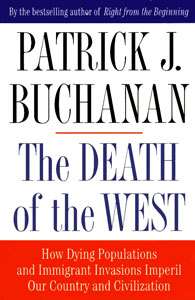The Death of the West
The Death of the West: How Dying Populations and Immigrant Invasions Imperil Our Culture and Civilization is a 2001 book by paleoconservative commentator Patrick J. Buchanan, in which the author argues that western culture is dying and will soon be imperilled. Western cultures have lower-than-replacement birth rates while populations in Africa, Asia, and Latin America are exploding.
 | |
| Author | Patrick J. Buchanan |
|---|---|
| Country | United States |
| Language | English |
| Publisher | St. Martin's Griffin |
Publication date | 2001 |
| Media type | Print (Hardcover and Paperback) |
| Pages | 320 |
Summary
The title of the book is a reference to Oswald Spengler's Decline of the West. Buchanan argues that the culture that produced western civilization as traditionally understood is in its death throes in the United States which will no longer be a western country by the year 2050.[1] He uses United Nations population statistics to analyze the recent trends in global populations, especially major declines in European nations and major increases in Asia, Africa, and Latin America.
Buchanan argues that the United States has a "nation within a nation" already. The population of 30 million foreign born (of which 11 million are "illegal aliens") is larger than the entire population of Rhode Island, Massachusetts, and Connecticut.
Buchanan argues that "counter culture" of the 1960s has become the dominant culture, which aims to rewrite American history and dismantle its heritage. He sees this as a hostile culture which regards western civilization with antipathy. He writes: "A new generation has now grown up for whom the cultural revolution is not a revolution at all, but the culture they were born into and have known all their lives." He sees the new culture as being intolerant towards those of differing beliefs and determined to impose political correctness.
Buchanan argues that the death of the Christian faith is the primary cause of low birth rates, hopelessness, and political utopianism. He cites examples of anti-Christian sentiment such as the negative reactions to Catholic films and the triumphant attitude of secularism. He writes: "Western Man has decided he can disobey God without consequence and become his own God." And at the same time: "The new hedonism seems unable to give people a reason to go on living." He depicts the United States as a country divided between the old culture and the new with little contact between two diametrically opposed systems of thought.
Reception
John Attarian praised the book.
To avert catastrophe, Buchanan rightly calls for repudiating the left's ideology of national suicide. But he offers valuable specifics too. It may be too late for Europe to exit the highway, but America still can. Depopulation being the worse problem, we must encourage American women to have children, with pro-family tax relief such as raising the federal tax credit for each child, giving employers tax incentives to pay parents higher wages, and so on... Buchanan concedes that it may be too late to save the West, but closes by affirming that America is a beautiful country. "And that is why we must never stop trying to take her back." That call to undaunted perseverance is the right parting note.[2]
Kirkus Reviews panned the book. The review called it "[s]hameless, embarrassing rantings" and also remarked that "[l]ittle attests to the moral health of this nation more than the fact that it’s made a mockery of Buchanan's presidential ambitions time and again." The review particularly criticized Buchanan's claim that "[h]ad it not been for the West, African rulers would still be trafficking in the flesh of their kinsmen" as an example of dishonest historical revisionism.[3]
Jonah Goldberg of The National Review:
First, let me say I both admire and dislike Buchanan's writing for the same reason: He brilliantly manages to do with one language what Yassir Arafat does with two. He offers red meat to the extremists while at the same giving himself the wiggle room to deny he said anything controversial in the first place. This is no mean feat.[4]
See also
References
- "Death of the West - Pat Buchanan". www.stewartsynopsis.com. Retrieved 2016-05-07.
- "The Social Contract - Book Review of 'Death of the West' by Patrick Buchanan". www.thesocialcontract.com. Retrieved 2016-05-07.
- "The Death of the West by Patrick J. Buchanan". Kirkus Reviews. November 15, 2001. Retrieved October 27, 2012.
- Goldberg, Jonah (February 25, 2002). "Goldberg File". The National Review.